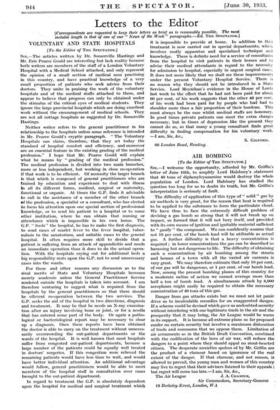Letters to the Editor
(Correspondents are requested to keep their letters as brief as is reasonably possible. The most suitable length is that of one of our News of the Week paragraphs.—Ed. Thu SPECTATOR.]
VOLUNTARY AND
[To the Editor of THE SPECTATOR.] SIR,—The articles written by Dr. Somerville Hastings and Mr. Eric Pearce Gould are interesting but lack reality because both writers are members of the staff of a London Voluntary Hospital with a Medical School attached, and only represent the opinion of a small section of medical men practising in this country, and have practical 'knowledge of a very small proportion of patients who seek advice from their doctors. They unite in praising the work of the voluntary hospitals and of the medical staffs attached to them, and appear to believe that progress can only be obtained under the stimulus of the critical eyes of medical students. They ignore the large provincial hospitals which are doing excellent work without the encouragement of medical schools. They are not all cottage hospitals as suggested by Dr. Somerville Hastings.
Neither writer refers to the general practitioner in his relationship to the hospitals unless some reference is intended in Mr. Pearce Gould's cryptic paragraph. "The Voluntary Hospitals can claim,- therefore,- that they set today the standard of hospital comfort and efficiency, and moreover are an essential feature in the existing grading of the medical profession." I hope that Mr. Pearce Gould will explain what he means by "grading of the medical profession." The medical profession is divided into two main branches, more or less independent, but working in close co-operation if that work is to be efficient. Of necessity the larger branch is that which is composed of general practitioners who are trained by education and experience to deal with illness In all its different forms, medical, surgical or maternity, functional or organic. At times the G.P. finds it advisable to call in the assistance of a member of the other branch of the profession, a specialist or a consultant, who has elected to focus his attention upon one special section of professional knowledge, or to send his patient to a hospital or to some other institution, where he can obtain that nursing or attendance which is impossible in his own home. The G.P. " feeds " the hospital, he has to make the first diagnosis, to send cases of scarlet fever to the fever hospital, tuber- culosis to the sanatorium, and suitable cases to the general hospital. It often requires more skill to decide that a patient is suffering from an attack of appendicitis and needs an immediate operation than it does to do the actual opera- tion. With the hospitals crying out for additional beds a big responsibility rests upon the G.P. not to send unnecessary cases into the wards.
For these and other reasons any discussion as to the rival merits of State and Voluntary Hospitals becomes merely academic unless the General Practitioner Service rendered outside the hospitals is taken into account. I am therefore venturing to suavest what is required from the hospitals by the general practitioners so that there should be efficient co-operation between the two services. The G.P. seeks the aid of the hospital in two directions, diagnosis and treatment. It may be that he needs an X-ray examina- tion after an injury involving bone or joint, or for a needle that has entered some part of the body. Or again a patho- logical or bacteriological report may be necessary to clear up a diagnosis. Once these reports have been obtained the doctor is able to carry on the treatment without unneces- sarily overcrowding the out-patient departments or the wards of the hospital. It is well known that most hospitals suffer from congested out-patient departments, because a large number of the patients could be equally well treated in doctors' surgeries. If this congestion were relieved the remaining patients would have less time to wait, and would have better individual attention. An additional advantage would follow, general practitioners would be able to meet members of the hospital staff in consultation over cases brought to the out-patient department.
In regard to treatment the G.P. is absolutely dependent upon the hospital for medical and surgical treatment which
STATE HOSPITALS it is impossible to provide at home. In addition to this treatment is now carried out in special departments, which involves costly apparatus and specialized technique and knowledge. There is definite need for a service of consultants from the hospital to visit patients in their homes and to advise their medical attendants in regard to the necessity for admission to hospital, especially in urgent surgical cases. It does not seem likely that we shall see these improvements under the present Voluntary' Hospital Service. There is no reason why they should not be introduced in a State Service. Lord Moynihan's evidenee in the House of Lords last week to the effect that he had not been paid for about 60 per cent, of his work suggests that the other 40 per cent. of his work had been paid for by people who had had to shoulder more than a fair proportion of their burdens. This must always be the case whilst medical staffs are honorary. In good times private patients can meet the extra charges necessary, but in times of depression like the present they cannot do so, so that many a young consultant finds great difficulty in finding compensation for his- voluntary work. —I am, Sir, &c.,
60 London Road, Reading.
S. GILFORD.










































 Previous page
Previous page